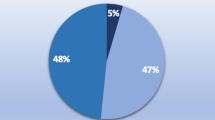Abstract
Based on a behavioral analysis of compliance with breast self-examination (BSE), this study replicates a previously successful stimulus control intervention and tests the effectiveness of two types of reward for increasing compliance: external reward and self-reward. Patient volunteers (N=153) were randomly assigned to experimental conditions and followed for 1 year, equally divided into experimental and postexperimental periods. Compliance was measured by the monthly return of BSE records, with self-reports used as a secondary measure. The results indicate that external reward was most effective; self-reward was used by only half the participants but was effective when used. In the postexperimental period, all rates of record return declined, especially in the external reward group. A cycle-by-cycle analysis indicates that the decline was gradual except for a sharp drop when the external reward was withdrawn. The results are discussed in terms of the acceptability of both interventions and contingencies.
Similar content being viewed by others
References
Bem, D. J. (1972). Self-perception theory. In Berkowitz, L. (ed.).Advances in Experimental Social Psychology, Vol. 6, Academic Press, New York.
Bennett, S. E., Lawrence, R. S., Fleischman, K. H., Gifford, C. S., and Slack W. V. (1983). Profile of women practicing breast self-examination.JAMA 249(4): 488–491.
Boyle, M., Michalek, A., Bersani, G., Nemoto, T., and Mettlin, C. (1981). Effectiveness of a community program to promote early breast cancer detection.J. Surg. Oncol. 18: 183–188.
Calnan, M. W., Chamberlain, J., and Moss, S. (1983). Compliance with a class teaching breastelf-examination.J. Epidemiol. Commun. Health 37: 264–270.
Franks, C. M., and Wilson, G. T. (1975). Behavior therapy and eating disorders. In Franks, C. M., and Wilson, G. T. (eds.),Annual Review of Behavior Therapy Theory and Practice, Brunner/Mazel, New York.
Gallup Organization (1984).1983 Survey of Public Awareness and Use of Cancer Detection Tests, Summary of the Findings, American Cancer Society, New York.
Gastrin, G. (1976). New techniques for increasing the efficiency of self-examination in early diagnosis of breast cancer.Br. Med. J. 2: 745–746.
Grady, K. E. (1984). Cue enhancement and the long-term practice of breast self-examination.J. Behav. Med. 7: 191–204.
Grady, K. E., Kegeles, S. S., Lund, A. K., Wolk, C. H., and Farber, N. J. (1983). Who volunteers for a breast self-examination program? Evaluating the bases for self-selection.Health Educ. Q. 10(2): 79–94.
Jeffrey, D. B. (1974). A comparison of the effects of external control and self-control on the modification and maintenance of weight.J. Abnorm. Psychol. 83: 404–410.
Lepper, M. R., Greene, D., and Nisbett, R. E. (1973). Undermining children's intrinsic interest with extrinsic rewards: A test of the “overjustification” hypothesis.J. Personal. Soc. Psychol. 28: 129–137.
Mayer, J. A., and Fredericksen, L. W. (1986). Encouraging long-term compliance with breast self-examination: The evaluation of prompting strategies.J. Behav. Med. 9: 179–189.
Premack, D. (1965). Reinforcement theory. In Jones, M. R. (ed.),Nebraska Symposium on Motivation: 1965, University of Nebraska Press, Lincoln.
Author information
Authors and Affiliations
Additional information
This investigation was supported by PHS Research Grants CA 26216 and CA 36798, awarded by the National Cancer Institute, DHHS.
Rights and permissions
About this article
Cite this article
Grady, K.E., Goodenow, C. & Borkin, J.R. The effect of reward on compliance with breast self-examination. J Behav Med 11, 43–57 (1988). https://doi.org/10.1007/BF00846168
Accepted:
Issue Date:
DOI: https://doi.org/10.1007/BF00846168




